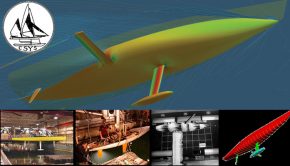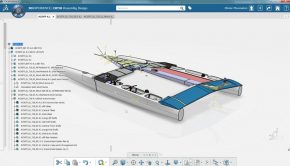Registration Open for Chesapeake Sailing Yacht Symposium
Published on February 1st, 2016
The 22nd edition of the Chesapeake Sailing Yacht Symposium (CSYS), held over March 18-19, 2016, is now open for registration. The location of this year’s event will be returning to where it had been held for many years in the past, at the US Naval Academy in Annapolis, Maryland, USA.
The 2016 CSYS is co-organized by the Society of Naval Architects and Marine Engineers (SNAME) and the Sailing Yacht Research Foundation (SYRF) and will feature work from some of the world’s top talent in design, engineering and research to discuss a myriad of topics related to sail and sailboat design, sailing dynamics and performance analysis. The titles and abstracts of the accepted papers for the conference are on the CSYS website now for review.
First held in 1974, the CSYS has been an important biennial event to present and discuss the technical and academic approaches to understanding sailing, with many attendees traveling to Annapolis from their research labs around the world. Since the last CSYS in 2013 the event has converted to a triennial format so as to rotate yearly with two other similar conferences, the High Performance Yacht Design Symposium in New Zealand and the INNOVSAIL conference in France.
In addition to attracting and presenting technical papers of the highest quality, the CSYS has published papers on sailing technology since 1974. Through its partnership with SYRF, these papers are being made more readily available than ever before for designers, students and regular sailors alike through SYRF’s online Library resource.
Presentations made at CSYS cover a broad range of subject matter, from rigorous investigations in the applied sciences to studies performed on topics that are appealing to a broader audience in the sailing community. The papers and topics presented on Saturday, March 19th are of this more general appeal, and will be led by a keynote address from global sailing personality and World Sailing Vice President Gary Jobson.
“Sailing has always been a technical sport, but now more than ever before we need to understand and embrace the role technology can play to use its power to make it faster and more exciting, but safer and sustainable as well,” said Jobson. “It’s a pleasure to be asked to speak at this prestigious gathering. I hope many sailors will join all of us here who share a passionate interest in helping shape our understanding of the sport.”
The CSYS will also precede two days of meetings held by the Offshore Racing Congress’s International Technical Committee, where members of this committee of designers and technologists discuss their ideas on improving the science of VPP-based handicapping. The ITC meeting is open to registered observers and will be held over March 20-21 at the Severn Sailing Association.
“For those that have any level of interest – professional or amateur – in sailing technology but have never attended the CSYS, now is the time to attend before the next event is held in 2019,” said Jaye Falls, Chairman of the 22nd CSYS. “Besides sharing the latest research in the technical advancement of the sport, the frequent coffee breaks we have during the symposium and a social event in the evening of Saturday, March 19th will give attendees the opportunity to visit with old friends and make new acquaintances in the sailing world.”
“We are pleased to be partners with CSYS for the first time,” said Steve Benjamin, Chairman of the Board of SYRF. “This event fits perfectly with our mission to help promote the science of sailing as it relates to handicap rating rules, as well as to provide an online and accessible catalog of all the great research work that CSYS has published over the years. Much of the work being presented here has relevance to our mission.”
For more information on CSYS, visit www.sname.org/chesapeakesailingyachtsymposiumcsys/home.









 We’ll keep your information safe.
We’ll keep your information safe.